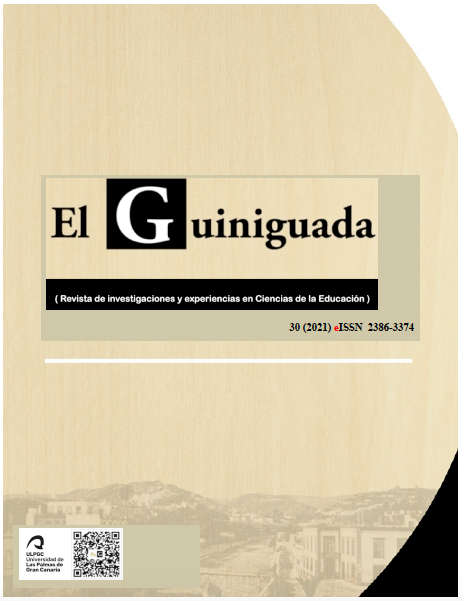Legal, scientific and educational analysis of the use of shared teaching in the secondary educational stage in the Canary Islands
doi.org/10.20420/ElGuiniguada.2021.411
Keywords:
inclusive education, co-teaching, schoolchildren, educational supportAbstract
Inclusive education is a legal right that no institution - or faculty - should question or ignore. Faced with this situation, shared teaching has been positioned as a methodological strategy that can contribute to really achieving this right. Therefore, the objective of the manuscript was to analyze at a legal, scientific and educational level the use of shared teaching in the Secondary Education stage in the autonomous community of the Canary Islands. In short, it could be said that shared teaching is under the protection of the national and regional legal framework. At the scientific level, shared teaching offers a response to the educational needs presented by students. At an educational level, in the autonomous community of the Canary Islands there are several programs developed by the Ministry of Education in which shared teaching acquires a leading role to carry them out satisfactorily.
Downloads
References
Burks-Keeley, R. G., & Brown, M. R. (2014). Student and Teacher Perceptions of the Five Co-Teaching Models: A Pilot Study. Journal of the American Academy of Special Education Professionals. 149-185.
Campbell, E. L., Reedy, A. R., Baird, M. J., & Baird, D. M. (2018). Better Together: Co-Teaching in Undergraduate Applied Psychology Courses. Psychology Teaching Review, 24(2), 3-11.
Céspedes, I. F., Guajardo, G. S., Cárcamo, J. S., & Yáñez-Urbina, C. (2020). Coenseñanza entre docentes de educación general básica y educadoras diferenciales: incidentes críticos de la práctica colaborativa en proyectos de integración educativa. Pensamiento Educativo, 57(1).
Chitiyo, J. (2017). Challenges to the use of coteaching by teachers. International Journal of Whole Schooling, 13(3), 55-66.
Chitiyo, J., & Brinda, W. (2018). Teacher preparedness in the use of co‐teaching in inclusive classrooms. Support for Learning, 33(1), 38-51. https://doi.org/10.1111/1467-9604.12190
Dagli, O., Akcamete, G., & Guneyli, A. (2020). Impact of co-teaching approach in inclusive education settings on the development of reading skills. International Journal of Education, 8(1), 1-17. https://doi.org/10.18488/journal.61.2020.81.1.17
Downey, J. M. (2017). Perceptions of co-teaching in the middle school English language arts classroom. Theses and Dissertations. 2376.
Graziano, K. J., & Navarrete, L. A. (2012). Co-teaching in a teacher education classroom: Collaboration, compromise, and creativity. Issues in Teacher Education, 21(1), 109-126.
Lindacher, T. (2020). Perceptions of regular and special education teachers of their own and their co-teacher’s instructional responsibilities in inclusive education: A case study. Improving Schools. https://doi.org/10.1177/1365480220906697
Lochner, W. W., Murawski, W. W., & Daley, J. T. (2019). The Effect of Co-teaching on Student Cognitive Engagement. Theory & Practice in Rural Education, 9(2), 6-19. https://doi.org/10.3776/tpre.2019.v9n2p6-19
Olmos, P, Gavaldà, J. S., & Torelló, Ó. M. (2018). El alumnado de educación secundaria obligatoria ante la inclusión educativa y la docencia compartida. REOP-Revista Española de Orientación y Psicopedagogía, 29(3), 8-24. https://doi.org/10.5944/reop.vol.29.num.3.2018.23318
Pancsofar, N., & Petroff, J. (2013). Professional development experiences in co-teaching: Associations with teacher confidence, interests, and attitudes. Teacher Education and Special Education, 20(10), 1-14. https://doi.org/10.1080/13603116.2016.1145264
Rodríguez, J. L. (2017). La promoción del empredimiento social mediante metodologías innovadoras: hacia un nuevo paradigma educativo. Lan harremanak: Revista de relaciones laborales, 37, 67-82. https://doi.org/10.1387/lan-harremanak.18413
Sanahuja, J. M., Mas, O., y Olmos, P. (2018). El rol del profesorado de apoyo en el aula regular de un instituto de educación secundaria. Revista Complutense de Educación, 29(4), 141. https://doi.org/10.5209/RCED.54608
Shin, M., Lee, H. & McKenna, J. W. (2016). Special education and general education preservice teachers’ co-teaching experiences: A comparative synthesis of qualitative research. International Journal of Inclusive Education, 20(1), 91-107. https://doi.org/10.1080/13603116.2015.1074732
Strogilos, V., Stefanidis, A. & Tragoulia, E. (2016). Co-teachers’ attitudes towards planning and instructional activities for students with disabilities. European Journal of Special Needs Education, 31(3), 1-16. https://doi.org/10.1080/08856257.2016.1141512
Suárez-Díaz, G. (2016). Co-enseñanza: concepciones y prácticas en profesores de una Facultad de Educación en Perú. Revista electrónica de investigación educativa, 18(1), 166-182. https://doi.org/10.24320/redie.2018.20.1.1383
Torelló, M., Olmos Rueda, P. & Sanahuja Gavaldà, J. M. (2018). Docencia compartida como estrategia para la inclusión educativa de alumnos con necesidades específicas de apoyo educativo. Revista de Educación Inclusiva, 11(1), 71-90. https://doi.org/10.5944/reop.vol.29.num.3.2018.23318
Published
How to Cite
Issue
Section
License
Authors who publish with this journal agree to the following terms:
- Authors retain copyright and grant the journal right of first publication with the work simultaneously licensed under a Creative Commons Attribution License that allows others to share the work with an acknowledgement of the work's authorship and initial publication in this journal. You can not make a commercial use of the work. The use derived from the work is also not allowed.
- Authors are able to enter into separate, additional contractual arrangements for the non-exclusive distribution of the journal's published version of the work (e.g., post it to an institutional repository or publish it in a book), with an acknowledgement of its initial publication in this journal.
- Authors are permitted and encouraged to post their work online (e.g., in institutional repositories or on their website) prior to and during the submission process, as it can lead to productive exchanges, as well as earlier and greater citation of published work (See The Effect of Open Access).

















